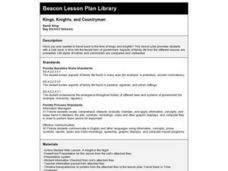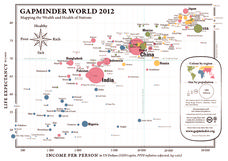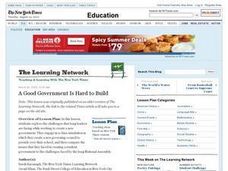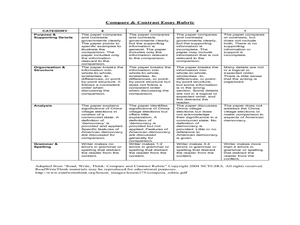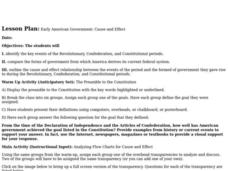Curated OER
U.S. and Canada: How are We the Same? How are We Different?
Get high school geographers to compare and contrast Canada and the United States. They begin by drawing a freehand map of North America, then complete readings to gain insight into Canada. The text is not provided; however, another text...
Curated OER
Wall Reading
Students are given practice in scan reading and in revising verb forms. They are given copies of Worksheet 2. Students are told that they should answer all the questions on the Worksheet and that it is a 'race.' They use thier short-term...
National Endowment for the Humanities
Factory vs. Plantation in the North and South
North is to factory as South is to plantation—the perfect analogy for the economy that set up the Civil War! The first lesson in a series of five helps teach beginners why the economy creates a driving force for conflict. Analysis of...
Curated OER
Comparing Sparta and Athens
Students are taught the differences between totalitarianism and democracy. They discuss the historical roots of the democratic tradition. Students are introduced to the term totalitarianism and are told that it is a form of government...
Curated OER
Kings, Knights, And Countrymen
Students look back in time into the feudal form of government. They view Powerpoint presentations to take them back in time.
Smithsonian Institution
Native Resistance: Native Resistance Then and Now
Native Americans lost so much—and gained so little in return. Scholars explore Native Americans' resistance to the United States government. The lesson uses primary sources to explore the different forms of protest and gives a voice to...
Curated OER
Gapminder World 2012
Here is a very interesting infographic that compares the average life expectancies, per capita incomes, and population sizes of every country in the world in 2012.
Curated OER
English Settlements in North America, A Royal Charter from the King
Fifth graders develop a colony to be evaluated by the teacher in the role of a "Royal Inspector". In this social studies lesson plan, 5th graders design aspects of a successful society by planning forms of government, politics, and an...
Curated OER
Comparing Canadian and U.S. Political Systems and Political Campaigns
Students interpret historical evidence presented in primary and secondary resources. For this political systems lesson, students conduct research to compare and contrast the forms of government in the United States and...
Curated OER
European Union Governance
Become familiar with the structure and functions of the European Union. As they conduct internet research, young historians use an attached worksheet to categorize the five main institutions of the EU. A flowchart worksheet also gives...
Curated OER
Rome's Rise To Power: The Republic
Middle schoolers investigate the government structure of ancient Rome. In this government systems lesson, students compare and contrast the government of ancient Rome with the government of the United States.
Curated OER
The Republic; Roman History, Democracy
Students explain the ways in which current American system of government both resembles and differs from the system of government in Rome form about 510 to 264 B.C.
Curated OER
A Good Government Is Hard to Build
Learners explore the challenges that Iraqi leaders are facing while working to create a new government. They engage in a class simulation in which they create a new governing council to preside over their school.
Curated OER
Democratic Village Elections in China: Comparing Governments of China and the United States
Learners explore democratic practices in China. In this global studies instructional activity, students compare and contrast democratic values of the Chinese government with the American government. Learners read provided articles and...
Curated OER
Comparative Government: Japan & the United States
Pupils compare the governmental systems of Japan and the United States. As a class, they discuss the differences between the parliamentary system and the presidential system. Pupils read provided handouts about the duties of a a...
Curated OER
Diversity Government
Students explore diversity through government. In this diversity lesson, students use types of government as a way to understand the importance of diversity. Students use "diversity beans" to facilitate discussion with one another.
Curated OER
Early American Government: Cause and Effect
Students explore cause and effect. For this early American government lesson, students research the series of events that led to the revolution, confederation, and constitution. Students use cause and effect examples to complete a...
Curated OER
Limited v. Unlimited Government
Students compare and contrast the characteristics of a limited and unlimited government. In groups, they use this information to create a chart and write a description of how leaders are chosen in each. They share their information...
The Alamo
Lorenzo de Zavala and José Antonio Navarro: Their Contributions to the Independence of Texas
Lorenzo de Zavala and José Antonio Navarro were both native Mexicans and leaders of the Texas Revolution, but with different backgrounds and careers. Compare and contrast the two influential men with a research assignment in which...
Federal Reserve Bank
“W” Is for Wages, W-4 and W-2
Don't let your young adults get lost in the alphabet soup of their paychecks and federal income taxes. Using sample pay stubs and reproductions of government forms, your class members will identify the purpose of such forms as a W-4 and...
Curated OER
The European Union and the Canadian Federation: Can they be Compared?
Tenth graders compare the European Union to the Canadian Federation. In this governing bodies lesson, 10th graders compare the structures of the 2 political organizations as they complete the provided handouts and graphic organizers.
Museum of Tolerance
The Role of Citizens in a Participatory Democracy
Groups research participatory democracies and compare the role and rights of citizens in ancient history with those in recent U.S. history. Guided by a series of questions, individuals compose a persuasive essay in which they discuss the...
Reading Through History
The Federalist Papers: Federalist Paper No. 51
How did Federalists feel about the federal government? Learners search for the answers in the Federalist Paper No. 51, which discusses the powers of the presidency. Then, they answer various questions to test for their comprehension of...
Curated OER
Introduction to "Julius Caesar"
Students discuss American form of government. They read the play Julius Caesar.






